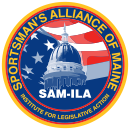Testimony in Opposition
LD 279, An Act to Give Veterans Priority in the issuance of Antlerless Deer Permits
LD 427, An Act to Give Certain Landowners First Priority for Antlerless Deer Permits
LD 555, An Act to Allow Owners of 25 Acres or More Land that is Open to the Public for Hunting to Take any Deer without a Special Permit.
LD 509, An Act to Allocate at Least 10 Percent of Antlerless Deer Permits Available in Each Wildlife Management District to Hunters 70 Years of Age and Older
LD 325, An Act to Amend the Process for Distributing Any Deer Permits
LD 340, An Act to Provide 100 Percent Disabled Veterans Antlerless Deer Permits in the Zone of Their Choice
Before the Joint Standing Committee on Inland Fisheries and Wildlife
Presented by David Trahan, Executive Director, Sportsman’s Alliance of Maine
March 2, 2017
Senator Cyrway, Representative Duchesne, distinguished members of the Inland Fisheries and Wildlife Committee, my name is David Trahan and I am representing the Sportsman’s Alliance of Maine testifying in opposition to six bills that affect our doe permit system.
The purpose of the doe permit system is as a conservation tool to protect and maintain healthy deer populations. In recent years the number of legislative bills to carve out special doe permit drawings and put politically attractive constituencies at the front of the line as it relates to being drawn for a doe permit continues to concern our organization. The wildlife of Maine belongs to all Mainers equally. When creating special exceptions that allow one group greater access to a resource, that policy change should have a conservation based purpose, in all cases, except one, we feel these bills do nothing to manage wildlife, instead, give special treatment to one class of people.
At some point, if this trend continues the average hunter could lose all access to hunt wildlife, while a select few have their pick of the litter. The only exception we see that is acceptable would be to give the Commissioner of Inland Fisheries and Wildlife the authority to issue a doe permit on a case by case basis when a person’s disability reaches the 100 percent level. We already have a system that allows the commissioner to use his judgement and issue a special permit allowing disabled individuals to, for example, hunt from a vehicle when their disability makes it impossible to hunt in the field.
If the committee wants to entertain the idea of granting such authority, we believe the choice of a WMD should be the Commissioners, not the hunters. Finally, a policy change like this should be for all 100 percent disabled hunters, not a select group and one of the deciding factors when issuing such a permit should be that a person’s disability does not allow them fair and equal opportunity to harvest a doe.
For these reasons, we oppose all of these bills:
- LD 279, An Act to Give Veterans Priority in the issuance of Antlerless Deer Permits
- LD 427, An Act to Give Certain Landowners First Priority for Antlerless Deer Permits
- LD 555, An Act to Allow Owners of 25 Acres or More Land that is Open to the Public for Hunting to Take any Deer without a Special Permit
- LD 509, An Act to Allocate at Least 10 Percent of Antlerless Deer Permits Available in Each Wildlife Management District to Hunters 70 Years of Age and Older
- LD 325, An Act to Amend the Process for Distributing Any Deer Permits
We testify in opposition to LD 340, An Act to Provide 100 Percent Disabled Veterans Antlerless Deer Permits in the Zone of Their Choice as written. If the committee wants to entertain the exception outlined in my previous testimony to expand the Commissioner’s authority to issue doe permits on a case by case basis, LD 340 could act as a vehicle to accomplish that statutory change.
